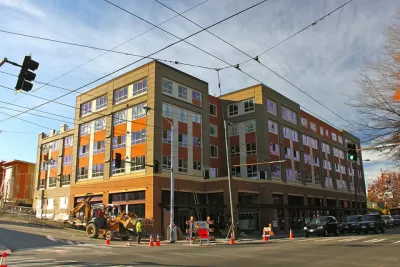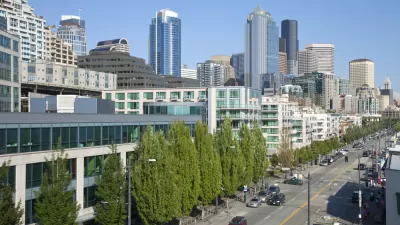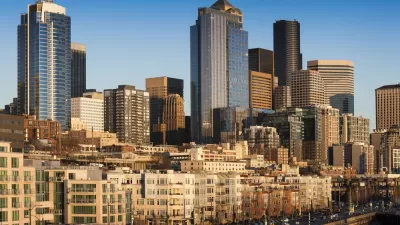Not just any apartments, only those served by frequent transit. Developers will still have a "mobility" requirement: In lieu of a parking space, they'll need to provide tenants with transit passes and memberships in car and bikeshare services.

"City officials say the idea of promoting ways to build apartments without parking is to make room for the denser development needed to accommodate the expected 120,000 new residents of Seattle in the next twenty years," reports Graham Johnson of KIRO 7.
In its presentation [PDF] on "Parking Requirements Near Transit" to the city's Planning, Land Use and Sustainability Committee on May 5, "the Department of Planning and Development [DPD] outlined a recommendation to require developers of new projects in neighborhoods with good transit to provide residents with a pass and membership in a car and bike sharing services," writes Johnson.
Density is but one of the objectives. The strategy can mitigate traffic congestion:
"We don't have enough roadway space for all of the vehicles if everyone was going to be expected to drive a car," said Bryan Stevens of DPD.
Affordability is also a key objective, particularly when tied to building micro-apartments, a housing type where Seattle is king. "At last count, 782 micro-housing units were cleared for occupancy in Seattle, with another 1,598 units in the pipeline," wrote Susan Kelleher for The Seattle Times on March 4. "No other American city comes close."
Housing without parking already exist for "about 2,400 units" according to Johnson, although he doesn't describe the housing types.
In February, Linda Byron of KING 5 News reported that "when it comes to parking, the housing boom is threatening to make free street parking a scarcer commodity in some areas, thanks to city policies that let developers off the hook when it comes to building parking spots in new apartment and condo complexes."
Bryon notes that the "parking-free" ordinance is not new—it goes back five years for housing served by frequent transit located in the two areas described below by DPD:
Urban Centers and Villages
Urban Centers and Villages are areas designated in Seattle's Comprehensive Plan to accommodate future population and job growth. These areas were adopted as part of the 1994 Comprehensive Plan to help guide land use and transportation policies.
Hat tip: Len Conly, Sierra Club Green Transportation.
FULL STORY: New apartments could offer transit passes instead of parking

Alabama: Trump Terminates Settlements for Black Communities Harmed By Raw Sewage
Trump deemed the landmark civil rights agreement “illegal DEI and environmental justice policy.”

Planetizen Federal Action Tracker
A weekly monitor of how Trump’s orders and actions are impacting planners and planning in America.

The 120 Year Old Tiny Home Villages That Sheltered San Francisco’s Earthquake Refugees
More than a century ago, San Francisco mobilized to house thousands of residents displaced by the 1906 earthquake. Could their strategy offer a model for the present?

Opinion: California’s SB 79 Would Improve Housing Affordability and Transit Access
A proposed bill would legalize transit-oriented development statewide.

Record Temperatures Prompt Push for Environmental Justice Bills
Nevada legislators are proposing laws that would mandate heat mitigation measures to protect residents from the impacts of extreme heat.

Downtown Pittsburgh Set to Gain 1,300 New Housing Units
Pittsburgh’s office buildings, many of which date back to the early 20th century, are prime candidates for conversion to housing.
Urban Design for Planners 1: Software Tools
This six-course series explores essential urban design concepts using open source software and equips planners with the tools they need to participate fully in the urban design process.
Planning for Universal Design
Learn the tools for implementing Universal Design in planning regulations.
Clanton & Associates, Inc.
Jessamine County Fiscal Court
Institute for Housing and Urban Development Studies (IHS)
City of Grandview
Harvard GSD Executive Education
Toledo-Lucas County Plan Commissions
Salt Lake City
NYU Wagner Graduate School of Public Service




























